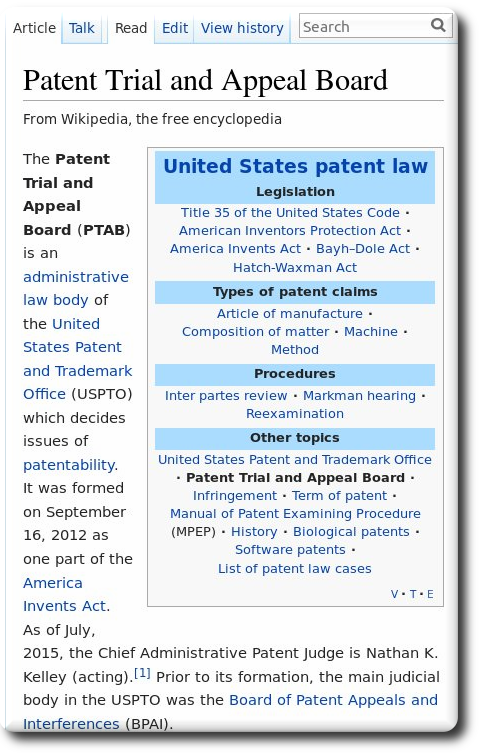

TECHRIGHTS has published well over a hundred articles about PTAB. Some were quite long. To European (or EPO) folks who don't know what PTAB is, think of it as the US equivalent of the Boards of Appeal (these are not identical but similar). They help assure patent quality and are pretty much independent from the patent gold rush.
At the height of the first dot-com bubble, many patent applications were filed that took common ideas and put them on the Internet. This month’s stupid patent, U.S. Patent No. 6,738,155 (“the ’155 patent”), is a good example of that trend.
The patent is titled “System and method of providing publishing and printing services via a communications network.” Generally, it relates to a “printing and publishing system” that provides “workflow services...using a communication network.” The original application was filed in 1999, and the patent issued in 2004.
The ’155 patent has a significant litigation history. Starting in 2013, its owner CTP Innovations, LLC, filed over 50 lawsuits alleging infringement, and told a court it intended to file as many as 200 additional cases. CTP claimed [PDF] that infringement of its patent was “ubiquitous” by the printing and graphic communications industry.
The Patent Office doesn’t always do the best job. That’s how Personal Audio managed to get a patent on podcasting, even though other people were podcasting years before Personal Audio first applied for a patent. As we’ve detailed on many occasions, patents are often granted on things that are known and obvious, giving rights to patent owners that actually belong to the public. As a result, it’s important for the public to have the ability to challenge bad patents.
Unfortunately, challenging bad patents in court can be hard and very expensive. In court, challenges are often decided by a judge or jury with little technical knowledge. Courts also require a high level of proof (“clear and convincing”) that can be hard to come by, especially after the passage of time.
[...]
In our amicus brief, we detail the long history of patents being used as a public policy tool, and how Congress has long controlled how and when patents can be canceled. We explain how the Constitution sets limits on granting patents, and how IPR is a legitimate exercise of Congress’s power to enforce those limits.
Yesterday, we filed an amicus brief (along with the Internet Association, the National Association of Realtors, the Software and Information Industry Association, the Association of Global Automakers, and SAS Institute) in the Oil States v. Greene’s Energy case in the Supreme Court. This case is a challenge to the constitutionality of the inter partes review (IPR) system, claiming that IPR is unconstitutional.
Oil States, a drilling company, patented a technique used in fracking. It then sued another drilling company, Greene’s Energy, claiming Greene’s had infringed the patent. Greene’s, faced with an expensive lawsuit, chose to file an IPR. The Patent Trials and Appeals Board decided that the Oil States patent was invalid, and the Federal Circuit affirmed.
Oil States, rather than accepting that the prior art disclosed their idea, chose to appeal their case to the Supreme Court, claiming that the same executive agency which determines whether to grant a patent cannot legally review whether that grant was erroneous. They claim that doing so violates Article III of the Constitution and the Seventh Amendment.
The Summary of Argument in the brief does a nice job of making our point, so I’ll just show you what we said.
he US Court of Appeals for the Federal Circuit affirmed a limited exclusion order issued by the International Trade Commission (ITC) against infringing “network devices, related software and components thereof,” finding no requirement that the ITC make specific findings regarding components of the accused products. Arista Networks, Inc. v. International Trade Commission, Case No. 16-2539 (Fed Cir., Sept. 27, 2017) (Reyna, J).
The ITC instituted a €§ 337 investigation in response to a complaint by Cisco alleging that Arista’s imports of certain network devices, related software and components thereof infringed six of Cisco’s patents. The administrative law judge (ALJ) issued a final initial determination finding a violation with respect to three of the six asserted patents (one had been withdrawn). Cisco and Arista each asked for ITC review. In its final determination, the ITC determined that Arista infringed the asserted claims of three of the remaining five patents, and entered a limited exclusion order against imports by Arista of “certain network devices, related software and components thereof.” Arista appealed the ITC’s claim construction of a term in one of the patents and the scope of the limited exclusion order.
[...]
The Federal Circuit noted that the ITC has “broad discretion in selecting the form, scope, and extent of [a] remedy, and judicial review of its choice of remedy necessarily is limited,” and that it will not interfere in an ITC remedy determination unless “the remedy selected has no reasonable relation to the unlawful practices found to exist.” The Court determined that blocking imports of articles that induce patent infringement has a reasonable relationship to stopping unlawful trade acts, and therefore found no error in the ITC’s limited exclusion order.